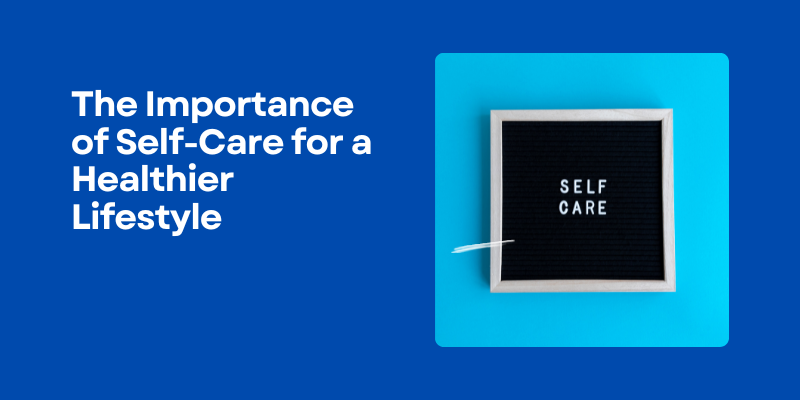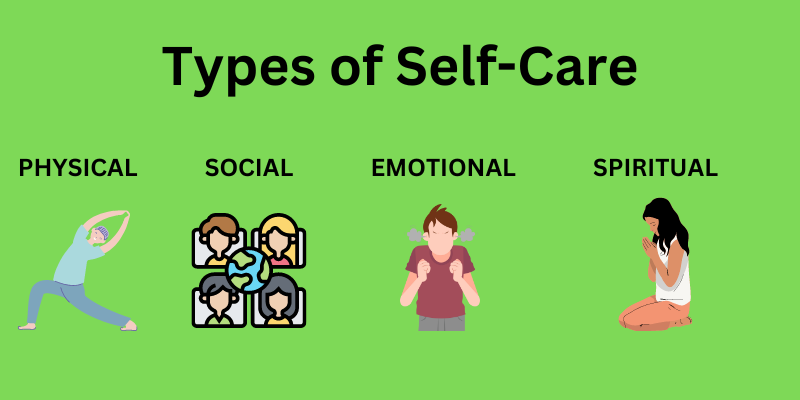The Importance of Self-Care for a Healthier Lifestyle

Are you searching for “The Importance of Self-Care for a Healthier Lifestyle”? Self-care has become a buzzword in recent years, but what does it actually mean? At its core, self-care refers to any activity or practice that an individual engages in to promote their physical, emotional, social, and spiritual well-being. With the ever-increasing demands of daily life, it’s easy to neglect self-care and prioritize external responsibilities.
However, taking the time to care for oneself is essential for maintaining good health and preventing burnout. In this article, we’ll explore the importance of self-care for a healthier lifestyle and provide practical tips for incorporating self-care into your daily routine..
Understanding Self-Care
Definition of Self-Care
Self-care encompasses any activity or practice that an individual engages in to promote their physical, emotional, social, and spiritual well-being. It is a holistic approach to health that recognizes the interconnectedness of various aspects of life. Self-care activities can range from basic needs like getting enough sleep and eating healthy foods to more intentional practices like meditation and self-reflection.
Self-care is not a one-size-fits-all approach, and what works for one person may not work for another. It is about finding what activities and practices help an individual feel recharged and refreshed and incorporating them into their daily routine. Ultimately, self-care is about taking responsibility for one’s own well-being and recognizing that it is a continuous and ongoing process.
The Importance of Self-Care
Self-care is crucial for maintaining good physical and mental health. Engaging in self-care activities can help reduce stress, increase energy levels, improve mood, and promote a positive outlook on life. It’s easy to prioritize external responsibilities like work and family over self-care, but neglecting one’s own needs can lead to burnout, exhaustion, and even physical illness.
Taking the time to care for oneself is not selfish, but rather a necessary component of a healthy lifestyle. Incorporating self-care into your daily routine can help prevent burnout, increase resilience, and promote overall well-being.
Types of Self-Care

Physical Self-Care
Physical self-care refers to taking care of your body to maintain good health and prevent illness. Here are some practical ways to incorporate physical self-care into your daily routine:
- Engage in regular exercise: This can include activities such as running, swimming, yoga, or weightlifting. Regular exercise can improve your physical health, boost your mood, and reduce stress.
- Get enough sleep: Aim for 7-8 hours of sleep per night to help your body rest and recharge.
- Practice good hygiene: This includes regular bathing, brushing your teeth, and washing your hands regularly to prevent the spread of germs and illness.
- Eat a balanced and nutritious diet: Incorporate a variety of fruits, vegetables, whole grains, and lean protein into your diet to maintain good health and prevent disease.
- Take breaks throughout the day: If you work at a desk or sit for long periods, take regular breaks to stretch and move your body. This can help prevent stiffness and soreness.
Emotional Self-Care
Emotional self-care involves taking care of one’s emotional well-being by identifying and expressing emotions in a healthy way. It’s important to acknowledge and accept one’s feelings, whether positive or negative, and take the time to process them. This can involve practices like journaling, talking with a trusted friend or therapist, or engaging in a creative outlet like art or music.
Additionally, setting healthy boundaries in relationships and learning to say “no” when necessary can help prevent emotional burnout. By prioritizing emotional self-care, individuals can improve their overall well-being and build stronger, healthier relationships with others.
Social Self-Care
Social self-care involves maintaining healthy relationships with friends, family, and the community. This type of self-care recognizes the importance of social connections for our overall well-being. Social support can provide a sense of belonging, reduce feelings of isolation, and increase feelings of happiness and contentment. Engaging in social self-care can involve participating in group activities, spending time with loved ones, volunteering, or joining a social club or organization.
It’s important to recognize that social self-care is not a one-size-fits-all approach, and individuals should focus on activities that align with their personal values and interests. By prioritizing social self-care, individuals can cultivate meaningful connections and improve their overall quality of life.
Spiritual Self-Care
Spiritual self-care involves nourishing the soul and connecting with something greater than oneself. This can take many forms, depending on an individual’s beliefs and values. Some people find solace in prayer or meditation, while others feel spiritually fulfilled through spending time in nature or engaging in creative pursuits.
Whatever the method, spiritual self-care helps individuals cultivate a sense of purpose and meaning in their lives. It can also provide comfort during difficult times and help individuals develop a sense of inner peace. By prioritizing spiritual self-care, individuals can improve their overall well-being and lead a more fulfilling life.
Benefits of Self-Care
Improved Physical Health
Improving physical health is one of the most tangible benefits of practicing self-care. Engaging in regular physical activity, eating a balanced diet, and getting adequate sleep are all essential components of maintaining good physical health. Exercise, in particular, has been shown to have numerous physical benefits, including strengthening the cardiovascular system, improving bone density, and reducing the risk of chronic diseases such as diabetes and heart disease.
Additionally, getting enough sleep is crucial for proper bodily function and can have a significant impact on overall health. By prioritizing physical self-care practices, individuals can improve their physical health and increase their longevity.
Improved Mental Health
One of the most significant benefits of practicing self-care is improved mental health. Engaging in self-care activities like meditation, exercise, or spending time in nature can help reduce stress and anxiety levels, promote relaxation, and improve overall mood. When individuals prioritize self-care, they are better equipped to handle the challenges and stressors that come their way.
Additionally, self-care can help prevent burnout, which can lead to a variety of negative mental health outcomes, such as depression and anxiety. By taking the time to care for oneself, individuals can develop a positive outlook on life and maintain good mental health.
Improved Relationships
Self-care not only benefits individuals, but it also has a positive impact on their relationships with others. When an individual takes care of themselves, they are better equipped to show up fully in their relationships with friends, family, and partners. Self-care activities like exercise and meditation can help individuals reduce stress and improve their mood, making them more patient and empathetic with others.
Additionally, setting boundaries around personal time and needs can help individuals develop healthier relationships by reducing resentment and promoting open communication. By prioritizing self-care, individuals can strengthen their connections with others and build healthier, more fulfilling relationships.
Tips for Practicing Self-Care

Prioritize Yourself
Prioritizing oneself may seem selfish, but in reality, it’s necessary for leading a healthy and fulfilling life. By neglecting self-care, individuals risk burnout, reduced productivity, and decreased quality of life. Here are some key points to keep in mind when prioritizing yourself:
- Remember that self-care is not a luxury, but a necessity.
- Recognize the importance of taking time for oneself and view it as an investment in overall well-being.
- Identify the self-care practices that work best for you and incorporate them into your daily routine.
- Set boundaries around external responsibilities and communicate your needs with others.
- Don’t hesitate to seek help or support when needed.
By prioritizing yourself, you’ll be better equipped to handle life’s challenges and enjoy the many benefits of good health and well-being.
Establish Boundaries
Establishing boundaries is a crucial component of self-care. Boundaries are the limits that an individual sets for themselves and others in various aspects of their life, such as work, relationships, and personal time. When boundaries are not established or respected, it can lead to stress, anxiety, and burnout. It’s essential to communicate these boundaries clearly to others and prioritize them in your own actions.
For example, if you need time alone to recharge, it’s okay to say no to social engagements or work-related events. By setting and respecting boundaries, you are taking care of yourself and creating a healthier environment for yourself and those around you.
Develop a Self-Care Plan
Developing a self-care plan is an essential step in making self-care a habit. It involves identifying activities and practices that promote your well-being and integrating them into your daily routine. A self-care plan can include activities like exercise, meditation, spending time with loved ones, or engaging in creative pursuits. It’s important to choose activities that you enjoy and that make you feel recharged and refreshed.
Additionally, it’s important to be realistic and set achievable goals for your self-care plan. You may need to start small and gradually increase the time you dedicate to self-care activities. By prioritizing self-care and developing a self-care plan, you’ll be better equipped to manage stress and maintain good health over the long term.
Engage in Activities You Enjoy
Engaging in activities that you enjoy is a crucial aspect of self-care. When we participate in activities that bring us pleasure or fulfillment, it can help reduce stress, improve mood, and boost overall well-being. The key is to choose activities that genuinely bring you joy rather than those you feel obligated to do.
This can be anything from going for a hike, reading a book, practicing a musical instrument, or cooking a favorite meal. The important thing is that the activity feels rewarding and rejuvenating for you. Incorporating enjoyable activities into your daily routine can help combat burnout and improve your overall quality of life.
Self-Care in the Workplace
Importance of Self-Care in the Workplace
Self-care is not just important for personal well-being, but it also plays a crucial role in the workplace. With the rise of remote work and the blurring of lines between work and home life, self-care has become more important than ever. Here are some reasons why self-care is essential in the workplace:
- Promotes productivity and creativity
- Reduces stress and burnout
- Increases job satisfaction and morale
- Improves relationships with colleagues
- Helps maintain a work-life balance
Incorporating self-care into the workplace can include taking breaks, setting boundaries, prioritizing tasks, and practicing mindfulness. By investing in self-care, both individuals and organizations can benefit from a healthier, more productive work environment.
Tips for Practicing Self-Care at Work
Many individuals spend the majority of their waking hours at work, making it a critical place to prioritize self-care. Here are some tips for practicing self-care at work:
- Take breaks throughout the day to stretch, walk, or simply breathe deeply
- Bring healthy snacks to keep you fueled and focused
- Create a calming workspace with plants or photos that make you happy
- Use your lunch break to do something you enjoy, such as reading or going for a walk
- Practice setting boundaries with coworkers and managers to prevent burnout and maintain a healthy work-life balance
- Utilize employee assistance programs or mental health resources provided by your workplace
Incorporating these small acts of self-care can make a big difference in your well-being and overall happiness at work.
Frequently Asked Questions
Q: What is self-care?
A: Self-care refers to any activity or practice that an individual engages in to promote their physical, emotional, social, and spiritual well-being. It involves taking care of oneself in a holistic manner to maintain overall health and prevent burnout.
Q: Why is self-care important?
A: Self-care is essential because it helps individuals maintain good health and prevent physical and mental burnout. It helps individuals develop a positive outlook on life, improve their relationships, and lead a more fulfilling life.
Q: What are some examples of self-care activities?
A: Self-care activities can include exercise, meditation, yoga, reading, taking a relaxing bath, spending time in nature, and engaging in creative activities like painting or writing. The activities should be ones that an individual enjoys and help them feel recharged and refreshed.
Q: How can I practice self-care at work?
A: Practicing self-care at work can include taking breaks throughout the day, engaging in relaxation techniques like deep breathing, and setting boundaries around work hours and workload. It’s also essential to develop healthy coping mechanisms for dealing with work-related stress.
Q: How can I make self-care a habit in my daily routine?
A: To make self-care a habit, it’s essential to prioritize self-care activities and incorporate them into your daily routine. This can involve setting aside a specific time each day for self-care, developing a self-care plan, and holding yourself accountable for sticking to the plan. It’s also important to be flexible and adapt the plan as needed to fit your schedule and needs.
The Importance of Self-Care for a Healthier Lifestyle Conclusion
In conclusion, self-care is essential for maintaining good health and overall well-being. While it may seem daunting to prioritize self-care in the midst of busy schedules and external demands, taking the time to care for oneself is crucial for preventing burnout, improving mental health, and promoting a healthier lifestyle.
By incorporating self-care practices into your daily routine, such as exercise, meditation, healthy eating, and setting boundaries, you can improve your physical, emotional, social, and spiritual health. Remember that self-care is not selfish or indulgent, but rather a necessary component of a happy and fulfilling life. So, make it a priority to take care of yourself, and watch as your overall quality of life improves.


